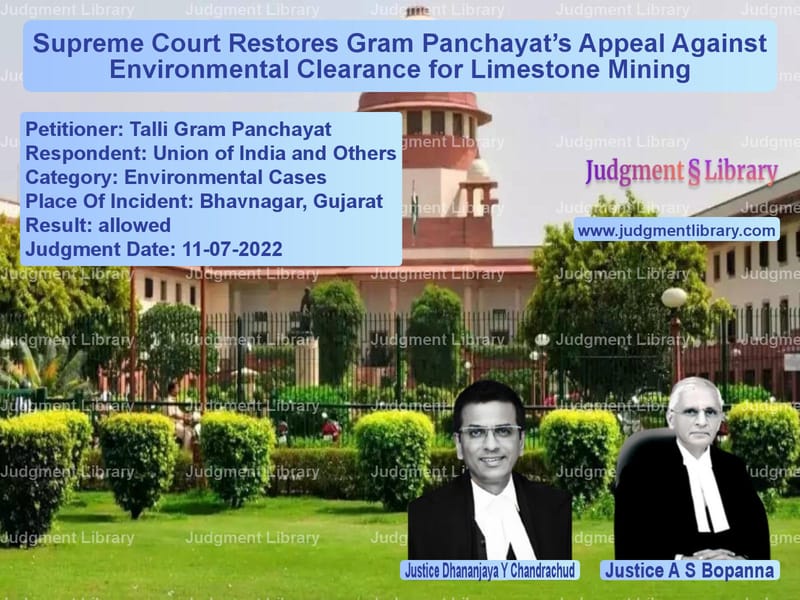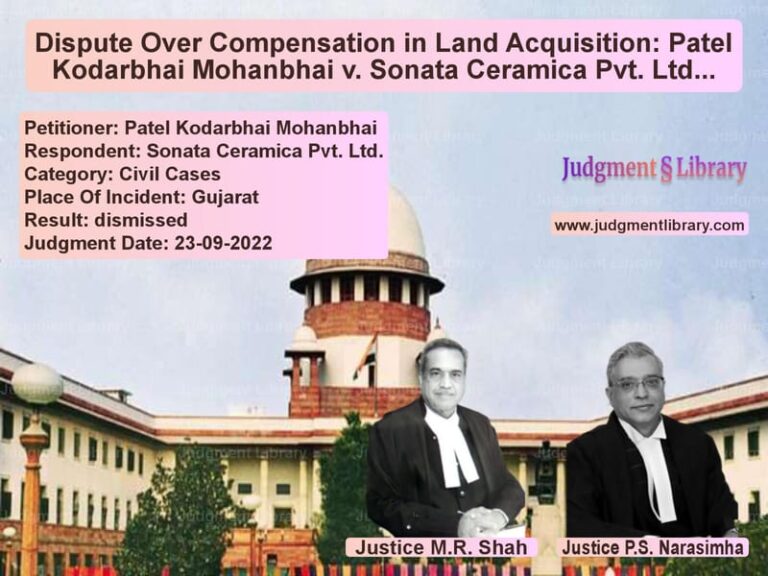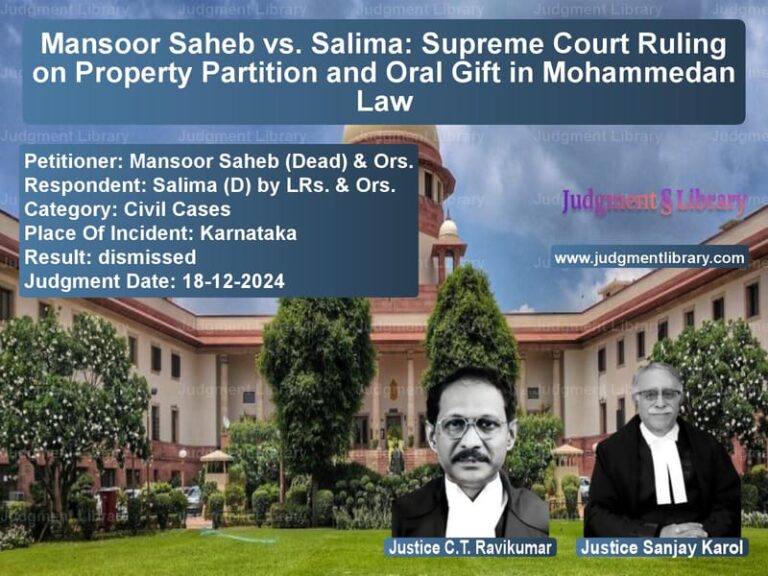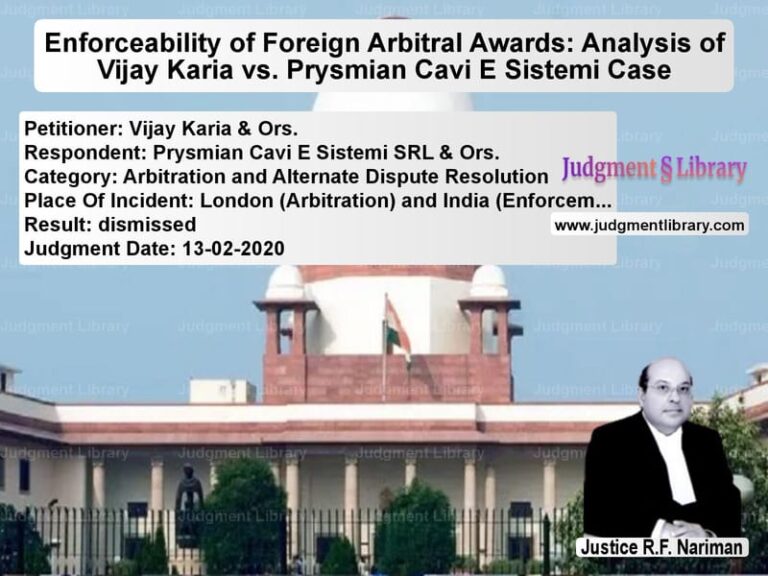Supreme Court Restores Gram Panchayat’s Appeal Against Environmental Clearance for Limestone Mining
The case of Talli Gram Panchayat vs. Union of India & Others represents a significant legal battle over environmental protection and procedural fairness. The dispute arose when Ultratech Cement Limited was granted environmental clearance for limestone mining in Gujarat. The Gram Panchayat challenged this decision, citing concerns about ecological damage and lack of consent from landowners. However, delays in the appeal process and legal questions regarding the composition of the National Green Tribunal (NGT) led to a complex legal dispute that reached the Supreme Court of India.
The judgment, delivered by a bench comprising Dr. Dhananjaya Y Chandrachud and A S Bopanna, dealt with crucial questions about the procedural validity of the NGT’s decisions, the role of single-member benches, and the fundamental rights of affected communities. Ultimately, the Supreme Court allowed the Gram Panchayat’s appeal, directing the NGT to reconsider the case.
Background of the Dispute
On 5 January 2017, the Ministry of Environment, Forest and Climate Change (MoEFCC) granted environmental clearance to Ultratech Cement Limited for limestone mining in the villages of Talli and Bambor, Bhavnagar, Gujarat. The project was sanctioned with a total production capacity of 0.53 million tonnes per annum.
The clearance was publicized through notices in two newspapers: “Saurashtra Samachar” in Gujarati and “Gujarat Samachar” in English. Additionally, a formal letter was issued to the Talathi-Cum-Mantri of the Gram Panchayat on 12 January 2017. However, the Gram Panchayat contested the sufficiency of these notifications, arguing that the statutory requirements for public disclosure were not met.
Grounds for the Challenge
The Talli Gram Panchayat filed an appeal before the National Green Tribunal (NGT), raising the following concerns:
- Ecological Sensitivity: The area where the mining project was sanctioned was part of the ‘Brujad Gir’ region, an ecologically sensitive area, which was allegedly concealed by Ultratech Cement in its project proposal.
- Land Rights Violation: Out of the total mining area of 193.3269 hectares, approximately 155.3269 hectares consisted of private agricultural land. Under the Mines and Minerals (Development and Regulation) Act, the project required the consent of all landowners, which was allegedly not obtained.
- Impact on Water Resources: The designated mining area fell within the catchment zone of four proposed reservoirs, which were meant to provide water for irrigation and drinking. Allowing mining activities could potentially threaten the region’s water security.
- Adverse Environmental Effects: The Gram Panchayat argued that extensive limestone mining would significantly harm the local ecosystem, affect biodiversity, and disrupt the livelihoods of residents who depended on agriculture.
Delay in Filing the Appeal
The appeal was filed before the NGT beyond the legally prescribed limit of 30 days. The Gram Panchayat sought condonation of delay, arguing that they were not adequately informed about the environmental clearance due to procedural lapses in public disclosure.
The fourth respondent, Ultratech Cement, opposed this plea, contending that the environmental clearance was widely publicized and that the limitation period should be calculated from the date of public notice and service to the Gram Panchayat.
Decision of the National Green Tribunal
The appeal was heard on 24 November 2017, where the NGT sought clarification on whether the environmental clearance had been uploaded online in accordance with the judgment in Save Mon Region Federation v. Union of India. Under this precedent, public access to environmental clearances via official websites was a mandatory requirement.
On 29 January 2018, a single-member bench of the NGT dismissed the Gram Panchayat’s plea for condonation of delay on the grounds of non-prosecution. The tribunal observed:
“As the Respondents pointed out, the applicant has shown no diligence in prosecution of this case. Hence, the Application stands rejected with no order as to costs.”
Supreme Court’s Intervention
The Gram Panchayat challenged the NGT’s decision before the Supreme Court, arguing that:
- The constitution of a single-member bench was contrary to Section 4(4)(c) of the NGT Act, which mandates that each bench must have both a judicial member and an expert member.
- The NGT’s dismissal of the application for condonation of delay violated principles of natural justice, as the Gram Panchayat’s lawyer had withdrawn, and the newly appointed lawyer was not given notice of hearings.
- The public notice of environmental clearance was not in conformity with legal requirements, thereby depriving the Gram Panchayat of a fair opportunity to challenge the decision.
The Supreme Court took note of the fact that on 11 January 2018, the Attorney General had assured that the legality of single-member benches would be rectified. Subsequently, on 31 January 2018, the Court directed that single-member benches should not be constituted.
Judgment of the Supreme Court
The Supreme Court held that the assumption of jurisdiction by a single-member bench was improper. It noted that the same NGT member had refrained from passing orders in other cases due to the pending resolution of the single-member bench issue.
The Court observed:
“The assumption of jurisdiction by a single member Bench clearly stands vitiated. The Single member could not have passed an order in view of the proviso to Section 4(4)(c) of the NGT Act 2010 which states that the number of expert members hearing the appeal or application shall be equal to the number of judicial members.”
Conclusion
The Supreme Court allowed the appeal and directed that the Gram Panchayat’s case be reconsidered by a properly constituted bench of the NGT. The ruling reaffirmed the importance of ensuring that judicial procedures comply with statutory provisions and that affected communities have a fair chance to challenge environmental decisions that impact their lives.
This case underscores the necessity for stringent compliance with environmental clearance procedures, upholding natural justice, and ensuring that tribunals function within the framework of law.
Petitioner Name: Talli Gram Panchayat.Respondent Name: Union of India and Others.Judgment By: Justice Dhananjaya Y Chandrachud, Justice A S Bopanna.Place Of Incident: Bhavnagar, Gujarat.Judgment Date: 11-07-2022.
Don’t miss out on the full details! Download the complete judgment in PDF format below and gain valuable insights instantly!
Download Judgment: talli-gram-panchayat-vs-union-of-india-and-o-supreme-court-of-india-judgment-dated-11-07-2022.pdf
Directly Download Judgment: Directly download this Judgment
See all petitions in Environmental Cases
See all petitions in Public Interest Litigation
See all petitions in Constitution Interpretation
See all petitions in Judgment by Dhananjaya Y Chandrachud
See all petitions in Judgment by A. S. Bopanna
See all petitions in allowed
See all petitions in supreme court of India judgments July 2022
See all petitions in 2022 judgments
See all posts in Environmental Cases Category
See all allowed petitions in Environmental Cases Category
See all Dismissed petitions in Environmental Cases Category
See all partially allowed petitions in Environmental Cases Category







